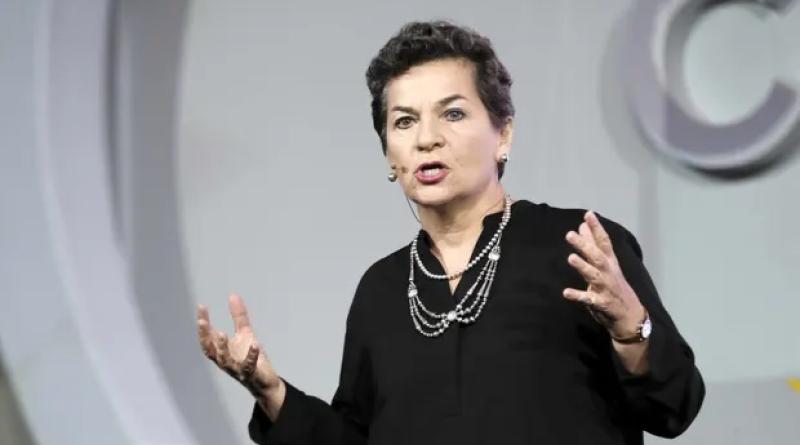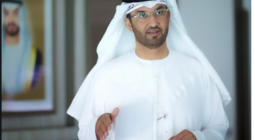Cop28 host UAE’s approach is ‘dangerous’, says UN’s ex-climate chief

The United Arab Emirates’ approach to the Cop28 climate summit it will preside over in November is “very dangerous” and a “direct threat to the survival of vulnerable nations”, according to the UN’s former climate chief.
Christiana Figueres, who was pivotal to the delivery of the landmark Paris climate agreement in 2015, also said the country holding the presidency of the UN summit could not put forward its own position and had to be neutral.
The UAE is a big oil and gas producer, and the designated president of the Cop28 summit is Sultan Al Jaber, who is also the head of the UAE’s national oil and gas company, Adnoc.
Figueres was responding to a speech by Al Jaber in which he said: “We must be laser focused on phasing out fossil fuel emissions, while phasing up viable, affordable zero carbon alternatives.”
That was widely interpreted to mean using carbon capture and storage (CCS) technology to capture CO2 emissions, and not completely phasing out fossil fuels themselves. “The fact that ‘emissions’ is in that sentence is very worrisome,” said Figueres, on the Outrage and Optimism podcast she co-hosts.
“So he is trying to dance on two dancefloors at the same time. He is trying to say: ‘Look, those of us who are producers of fossil fuels will be responsible for our emissions through enhanced carbon capture and storage. And we, or the Cop presidency, will also support the zero carbon alternatives.’”
“The fact that he thinks the [fossil fuel] energy used today will continue to be part of the global energy mix for the ‘foreseeable future’, I can see that from a UAE perspective,” Figueres said, adding that foreseeable is a “long time”.
“But from a Cop president perspective, it’s very dangerous. I just don’t see most countries, and certainly not the vulnerable countries, being willing to support the Cop president on this because it is a direct threat to their survival.”
“When you are the president of the Cop, you cannot put forward the position of the country that you’re coming from. You have to be able to be neutral.”
The world must slash CO2 emissions by 45% by 2030 to have a chance of limiting global heating to 1.5C. Figueres said: “We do not have CCS commercially available and viable over the next five to seven years. It’s just not going to happen. We have an issue of timing here, in addition to a moral issue.”
The appointment of Al Jaber as Cop28 president in January attracted significant criticism. The Guardian revealed in April that the UAE has the third biggest net zero-busting plans in the world for oil and gas expansion, surpassed only by Saudi Arabia and Qatar.
Scientists are agreed that most fossil fuel reserves must stay in the ground to meet the climate objectives of the Paris agreement, with the International Energy Agency (IEA) saying that new fossil fuel projects begun after 2021 are not compatible with reaching net zero emissions by 2050.
A Cop28 spokesperson said Al Jaber was “committed to lead an impartial process that gives space for all [countries] to express their views and find common ground”. He said it was a “misunderstanding” to think the phrase “phasing out fossil fuel emissions” referred only to CCS, noting Al Jaber’s call to triple renewable energy capacity and double hydrogen production by 2030 while using CCS to decarbonise heavy emitting industries, where other options were not viable.
“The focus on ending fossil fuel emissions responds to the immediate needs of decarbonisation in a pragmatic, practical and realistic way, especially given that the Intergovernmental Panel on Climate Change and IEA predict that fossil fuels will play a role in the energy mix through 2050 within a 1.5C aligned pathway” the Cop28 spokesperson said.
“That’s why [Al Jaber] has also called on the oil and gas industry to up its game, zero out methane emissions by 2030 and align around net zero by 2050.”
The IEA’s head, Fatih Birol, said on Saturday: “Many were hit hard by soaring energy prices in 2022. But for the oil and gas industry, it was a year of record profits. It’s now time to put that to use for wider benefit.”
He said emissions from oil and gas industry operations produced 15% of global emissions but these could be cut by 60% by 2030 with investment of $600bn. “[That is] much less than the trillions of dollars the industry accrued last year,” Birol said.
“This is a moment of truth: if the oil and gas industry wants to be taken seriously in climate discussions, it has to clean up its act. Hosted by a major oil and gas producer, Cop28 in the UAE is a unique opportunity [for the industry] to demonstrate a real commitment to cutting emissions.”
Figueres also heavily criticised the global fossil fuel industry and its “shocking” profits on a second recent podcast.
She said: “What astonishes me is that the oil and gas industry makes apparently no effort to get on the right side of history. They’re just flaunting their profits in front of everyone without any sensitivity to the impact of that.”
“These unprecedented profits are not being put to the use of humanity. They are being put to the use of the industry and its shareholders – a very tiny little portion of humanity. I am actually outraged that that is the choice that they have been making.”
The oil and gas industry has made an average of $1tn a year in pure profit for the past 50 years.
cover photo:Christiana Figueres was pivotal to the delivery of the Paris climate agreement in 2015. Photograph: Jeffrey Arguedas/EPA





